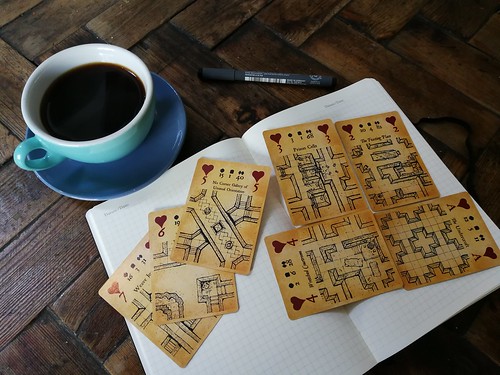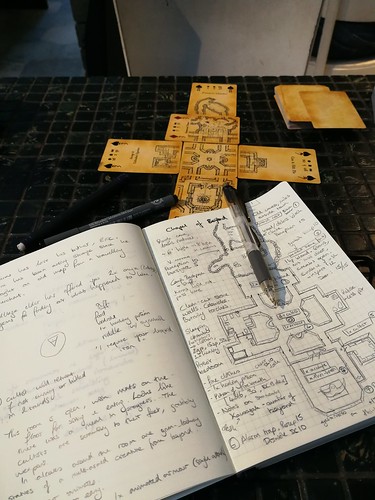Changes in circumstances in the tedious medium of Real Life means that a weekly RPG is increasingly difficult and even playing regularly with a consistent group is proving awkward. My previous game (two years in length, enjoyed by all) eventually came to an end because of these pressures and that group is, sadly, going to fragment. However everyone wants to keep playing so the question is, what can we do instead?
Organisation problems combined with a desire to try writing in a different way bring me to my one-shot project. Write a load of single-session adventures for low level characters. Fill them with detail and texture to keep them interesting, put together interesting challenges for low level characters, enjoy being able to run games without worrying about an overarching plot and having to have all players available. Over time I might stick these games together into a loose plot, but the adventures need to remain able to be run independently.
A key part of this is to make the writing of these sessions relatively simple. It takes weeks to write a full campaign world - I'm aiming to be able to turn out a good single-session adventure in an afternoon. For me, that will mean finding some tools to help laying out dungeon maps and design balanced encounters. It will also mean some playtesting before I get anything right. For now, here is what I'm using as my starting guidelines.
Have a strong dungeon theme
I want these adventures to feel like part of a wider, untold story, not a series of violent encounters with no purpose.
4 or 5 proper encounters
This should fill a 4 hour gaming session. They shouldn't all be combat!
Start at or near the dungeon mouth
For these games I'm just going to provide the party motivation. The players can fill in why their characters are part of the mission.
Two pages of notes
This is much more vague, but to avoid over-writing I am aiming to able to pull together everything I need in two pages of my notebook.
Tools of the trade

The cards you see are Dungeon Cards, available from Dice Shop. They are great for randomly generating dungeons very quickly. I deal a handful of cards and use them to stimulate ideas for a mini-setting and theme. Then I rearrange the cards until I get something around the right sort of size and turn it into a proper map which I can then fill with encounters.
The coffee is important.
Et voila:

I'm going to write a few of these and see how they play. If I'm feeling brave, I will also write them up and ask other people to try running them.
No comments:
Post a Comment